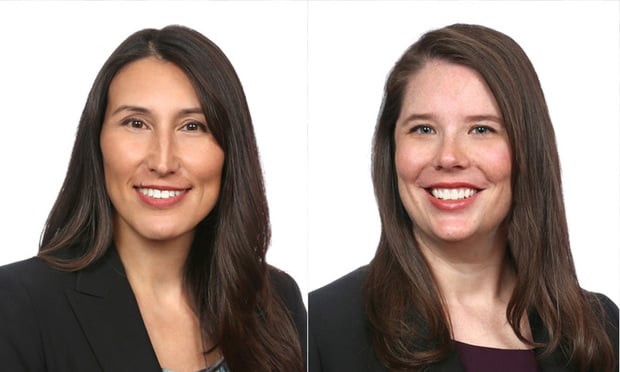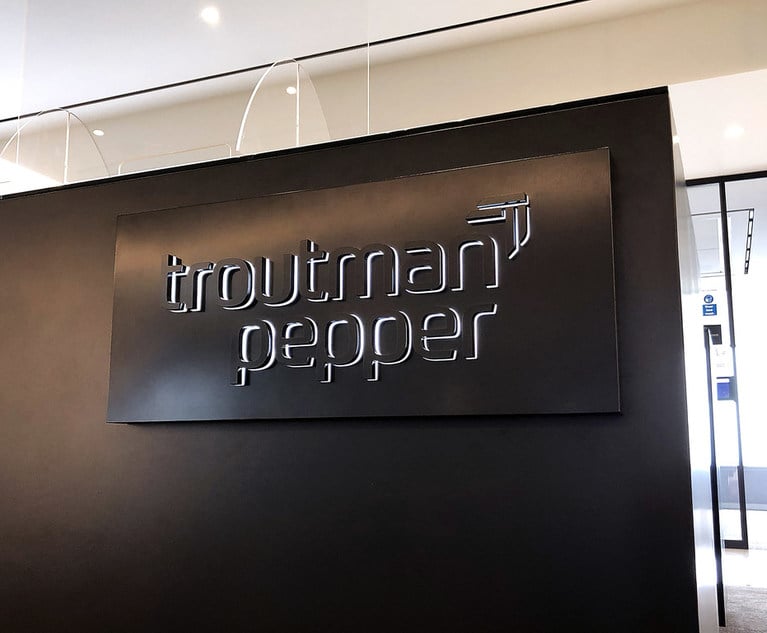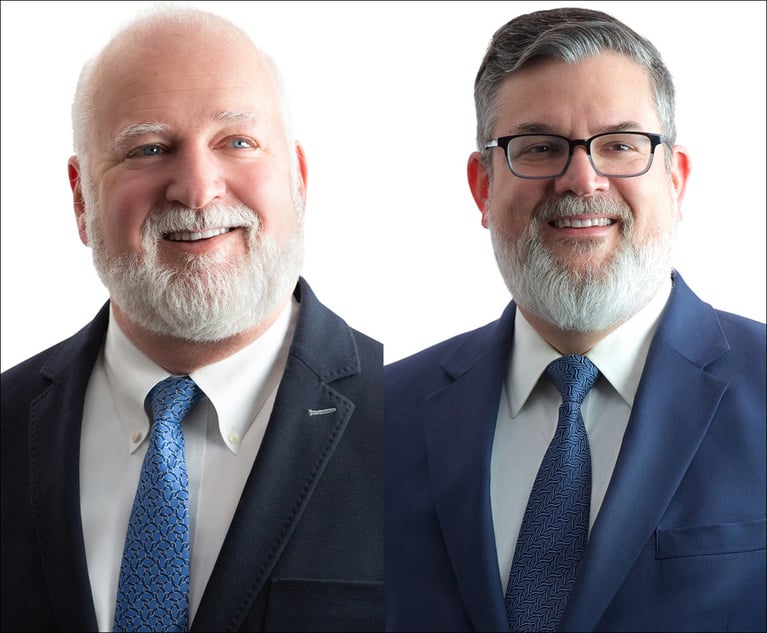The Seven Deadly Sins of Lawyers, #1: Sloth
As we begin a new year, the next several articles in this space will address the Biblical "seven deadly sins" through the lens of legal practice: sloth, pride, greed, lust, envy, gluttony and wrath.
January 07, 2019 at 10:56 AM
6 minute read
 Shari Klevens (left) and Alanna Clair, Dentons. (Courtesy photo)
Shari Klevens (left) and Alanna Clair, Dentons. (Courtesy photo)
Legal malpractice claim avoidance and compliance with ethical norms constitute a significant portion of the practice of law. Many firms have attorneys and professionals solely or at least partially dedicated to addressing and resolving potential risks to the practice.
As we begin a new year, the next several articles in this space will address the Biblical “seven deadly sins” through the lens of legal practice: sloth, pride, greed, lust, envy, gluttony and wrath. Even where lawyers and firms take special steps to prevent claims or comply with their ethical obligations, attorneys and firms still create risks for themselves by failing to answer to the better angels of their nature.
Although lawyers, as a profession, are considered to be detail-oriented and hard-working, some common mistakes made by lawyers are a result of a lack of attention. Indeed, attorneys can inadvertently fall into traps or routines in their practices that could increase potential exposure.
Here are some tips for how attorneys can overcome “sloth” and be vigilant about their responsibilities.
Be Aware of the Duty of Competence
Rule 1.1 of the ABA Model Rules of Professional Conduct provides: “A lawyer shall provide competent representation to a client. Competent representation requires the legal knowledge, skill, thoroughness and preparation reasonably necessary for the representation.” This is comparable to the typical standard of care owed by attorneys to clients, which, in most states, requires attorneys to exercise the care or skill commonly employed by other attorneys in similar conditions.
To that end, the standard of care owed by attorneys to clients evolves over time. The law changes, technology changes, and what an attorney is expected to know about those subjects changes over time. Thus, attorneys who do not undertake the effort to stay abreast of developments in the law or practice do themselves a disservice.
Many states recognize this need for attorneys to continue to learn about the law by requiring a number of hours each year dedicated to continuing legal education. Even for those states without any CLE requirement (or with a lower requirement), admitted attorneys may still seek out hours of training every year. Such training not only helps attorneys meet their ethical obligations of competence, but it can even be a business development tool for attorneys to attract clients and work.
Attorneys can find training on any number of subjects, from high-level, broad developments in the law to very niche analyses. Because the standard for competent legal representation evolves with time, attorneys can take steps to remain current in those issues that have evolved or arisen since they graduated from law school.
Following legal developments can be quite an undertaking and may require a number of hours of nonbillable effort. However, the sloth alternative is risky one.
Technology Continues to Evolve
It is a common refrain among seasoned lawyers that they are willfully ignorant regarding technology. Although lawyers are often at the forefront of many cutting-edge legal and commercial issues, it sometimes takes years for practitioners to catch up on technology advancements and risks.
However, a failure to educate oneself on emerging technology issues may create risk for the practitioner. Indeed, comment 8 to ABA Model Rule of Professional Conduct 1.1 is explicit that “a lawyer should keep abreast of changes in the law and its practice, including the benefits and risks associated with relevant technology.” Thus, attorneys who are dismissive of technology and state that they don't need it in their practice may be creating unnecessary exposure.
Sometimes, in conjunction with the duty to supervise, it is often sufficient for an attorney to work with others who are more competent in or knowledgeable about technological advances. Indeed, it is routine for attorneys to rely on junior attorneys or even staff to review technological issues and advise the supervising attorneys on recommendations or developments. Nonetheless, the supervising attorney may still face exposure if the attorney's team fails to meet expectations.
For example, the legal news is rife with stories about potential risks associated with cloud computing or hacking. Bars often consider this an ethical issue because attorneys have obligations to safeguard confidences and secrets, and sloppy cyber policies can expose clients' secrets.
If a client sues an attorney after a cyber breach and the exposure of secrets, the attorney would be well-served to point to all the safeguards the attorney had in place, showing the reasonableness of the attorney's conduct. However, an argument that the attorney did not really understand the technology and thus did not appreciate or understand the risks is less likely to be successful.
Using a Docketing System
Although deadlines can be missed for any number of reasons that do not indicate an attorney's overall incompetence, a missed deadline is an easy target for a plaintiff's legal malpractice attorney. Attorneys in such situations are then sometimes left to try to prove why a missed deadline is not evidence of negligence but is excused by some additional factor.
Thus, those attorneys who have established, reliable docketing systems to track deadlines may have a better chance of reducing their exposure for a missed deadline because they took reasonable steps to track their obligations. Other attorneys swear by their own “system” of writing deadlines in a diary or calendar, but such blind allegiance to analog ways can suggest that a missed deadline was inevitable.
Although many electronic docketing systems still rely on a human input element, it can be difficult in a modern practice to keep track of all court and client deadlines without electronic safeguards. In addition, using an electronic docketing system often involves many layers of people checking on deadlines and progress, which reduces the likelihood that a single attorney can forget a deadline.
By considering some of these extra steps to go above and beyond the daily grind, attorneys may have some success breaking their habits of sloth.
Shari L. Klevens is a partner at Dentons US in Atlanta and Washington, D.C., and serves on the firm's U.S. board of directors. She represents and advises lawyers and insurers on complex claims and is co-chair of Dentons' global insurance sector team.
Alanna Clair, also a partner at Dentons US in Washington, focuses on professional liability and insurance defense. Klevens and Clair are co-authors of “The Lawyer's Handbook: Ethics Compliance and Claim Avoidance” and the upcoming 2019 edition of “Georgia Legal Malpractice Law.”
This content has been archived. It is available through our partners, LexisNexis® and Bloomberg Law.
To view this content, please continue to their sites.
Not a Lexis Subscriber?
Subscribe Now
Not a Bloomberg Law Subscriber?
Subscribe Now
NOT FOR REPRINT
© 2025 ALM Global, LLC, All Rights Reserved. Request academic re-use from www.copyright.com. All other uses, submit a request to [email protected]. For more information visit Asset & Logo Licensing.
You Might Like
View All
28 Firms Supporting Retired Barnes & Thornburg Litigator in Georgia Supreme Court Malpractice Case
7 minute read
Troutman Pepper Says Ex-Associate Who Alleged Racial Discrimination Lost Job Because of Failure to Improve
6 minute read

Law Firms Expand Scope of Immigration Expertise Amid Blitz of Trump Orders
6 minute readTrending Stories
- 1Public Notices/Calendars
- 2Wednesday Newspaper
- 3Decision of the Day: Qui Tam Relators Do Not Plausibly Claim Firm Avoided Tax Obligations Through Visa Applications, Circuit Finds
- 4Judicial Ethics Opinion 24-116
- 5Big Law Firms Sheppard Mullin, Morgan Lewis and Baker Botts Add Partners in Houston
Who Got The Work
J. Brugh Lower of Gibbons has entered an appearance for industrial equipment supplier Devco Corporation in a pending trademark infringement lawsuit. The suit, accusing the defendant of selling knock-off Graco products, was filed Dec. 18 in New Jersey District Court by Rivkin Radler on behalf of Graco Inc. and Graco Minnesota. The case, assigned to U.S. District Judge Zahid N. Quraishi, is 3:24-cv-11294, Graco Inc. et al v. Devco Corporation.
Who Got The Work
Rebecca Maller-Stein and Kent A. Yalowitz of Arnold & Porter Kaye Scholer have entered their appearances for Hanaco Venture Capital and its executives, Lior Prosor and David Frankel, in a pending securities lawsuit. The action, filed on Dec. 24 in New York Southern District Court by Zell, Aron & Co. on behalf of Goldeneye Advisors, accuses the defendants of negligently and fraudulently managing the plaintiff's $1 million investment. The case, assigned to U.S. District Judge Vernon S. Broderick, is 1:24-cv-09918, Goldeneye Advisors, LLC v. Hanaco Venture Capital, Ltd. et al.
Who Got The Work
Attorneys from A&O Shearman has stepped in as defense counsel for Toronto-Dominion Bank and other defendants in a pending securities class action. The suit, filed Dec. 11 in New York Southern District Court by Bleichmar Fonti & Auld, accuses the defendants of concealing the bank's 'pervasive' deficiencies in regards to its compliance with the Bank Secrecy Act and the quality of its anti-money laundering controls. The case, assigned to U.S. District Judge Arun Subramanian, is 1:24-cv-09445, Gonzalez v. The Toronto-Dominion Bank et al.
Who Got The Work
Crown Castle International, a Pennsylvania company providing shared communications infrastructure, has turned to Luke D. Wolf of Gordon Rees Scully Mansukhani to fend off a pending breach-of-contract lawsuit. The court action, filed Nov. 25 in Michigan Eastern District Court by Hooper Hathaway PC on behalf of The Town Residences LLC, accuses Crown Castle of failing to transfer approximately $30,000 in utility payments from T-Mobile in breach of a roof-top lease and assignment agreement. The case, assigned to U.S. District Judge Susan K. Declercq, is 2:24-cv-13131, The Town Residences LLC v. T-Mobile US, Inc. et al.
Who Got The Work
Wilfred P. Coronato and Daniel M. Schwartz of McCarter & English have stepped in as defense counsel to Electrolux Home Products Inc. in a pending product liability lawsuit. The court action, filed Nov. 26 in New York Eastern District Court by Poulos Lopiccolo PC and Nagel Rice LLP on behalf of David Stern, alleges that the defendant's refrigerators’ drawers and shelving repeatedly break and fall apart within months after purchase. The case, assigned to U.S. District Judge Joan M. Azrack, is 2:24-cv-08204, Stern v. Electrolux Home Products, Inc.
Featured Firms
Law Offices of Gary Martin Hays & Associates, P.C.
(470) 294-1674
Law Offices of Mark E. Salomone
(857) 444-6468
Smith & Hassler
(713) 739-1250






